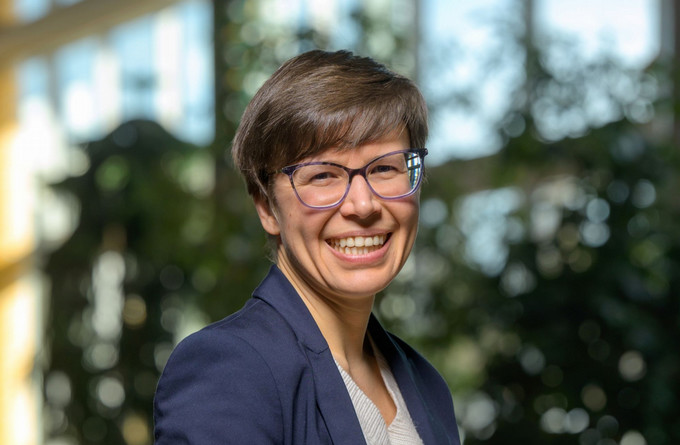
A Taste of Research
Connecting Minds, Discovering Possibilities
Join us for A Taste of Research: Connecting Minds, Discovering Possibilities. Experience an evening of big ideas made accessible as some of the University of Regina’s most inspiring researchers take the stage to share their work in short, engaging TED Talk–style presentations on topics ranging from media and music to wildfires and Métis identity in visual arts, to small nuclear reactor safety and AI’s role in global security. Join us for a front-row seat as we dive into discoveries that help connect, strengthen, and shape our world.
A Taste of Research: Connecting Minds, Discovering Possibilities
November 5, 2025
Darke Hall at the University of Regina College Avenue Campus
2255 College Avenue
7 p.m. Lecture
9 p.m. Meet ‘n Greet Coffee with the Presenters
Free admission. Register here!
Featured Presentations:
David Garneau • David Garneau will discuss how his metaphorical still life paintings depict how Indigenous folks navigate universities, museums, and other aspects of the contemporary world. These realistic representations of books, stones, bones, vegetables, mirrors, and other common items, engage classic genre themes while also considering war, the aging body, and non-human sentience.
Baily Hack • Newcomer youth in Canada face challenges like racism, isolation, and cultural marginalization in the Saskatchewan school system. By listening to the experiences of newcomer families, it can provide insight into how anti-racist education is currently used in classrooms, and how it can be used to better support newcomer students in the future.
Renata Raina-Fulton • Wildfires have brought to the public attention the importance of air quality. Dr. Raina-Fulton will provide a glimpse of the impact wildfires have on air quality downwind in cropped landscapes and bee yards throughout Saskatchewan where airborne contaminants may be contributing to honeybee decline.
Shaelyn Carr • Alibi evidence is rarely believed, often because close friends or family seem biased and there is no clear way to tell truth from lies. Carr's research aims to help establish an evidence-based tool to help police and courts judge alibi evidence more accurately, promoting greater fairness in the justice system.
Michael Angell • Performance on the Fazioli Pianoforte: Jacques Brel's Authentic Love. Angell's current research includes a partnership with our Faculty of Kinesiology and Health Studies on shoulder training for pianists.
Arthur Situm • SaskPower has recently announced an investment in nuclear energy focusing on Small Modular Reactors (SMRs). The new Safety and Licensing Testing (SMR-SLT) Centre, housed at the University of Regina, will help facilitate the rollout of SMRs in Saskatchewan which offer the potential for nuclear power with improved cost-efficiency through fleet-scale deployment and small up-front financing cost. Situm will provide a short overview of the facility.
Angèle Poirier • Canada is highly dependent on imported fruits and vegetables, making the food system vulnerable to trade wars, crop failures, and imported foodborne illnesses. The paradox is that we already grow many of these fruits and vegetables here. What governance arrangements might boost Canada’s self-sufficiency in non-tropical fruits and vegetables?
Merelda Fiddler-Potter • Indigenization and Reconciliation are terms frequently used to describe working with Indigenous peoples and including Indigenous content in higher education. But does this actually prioritize and protect Indigenous knowledge and people? In this presentation, Fiddler-Potter examines how making Indigenous knowledge foundational can elevate the experience for both students and the education practice.
Brian McQuinn • From Saskatchewan’s pandemic-era radicalization to the Taliban’s online propaganda and the AI analysis of drone imagery in Ukraine, digital platforms are redefining modern conflict and politics. This talk explores research on far-right mobilization, insurgent communication, and AI tools that help civil society track weapons, counter disinformation, and resist foreign influence.
2025 Presenters

Michael Angell

Merelda Fiddler-Potter
Merelda Fiddler-Potter is an associate professor at the First Nations University of Canada, cross-listed in Indigenous Communication Arts and Indigenous Business and Public Administration programs. Born and raised in Meadow Lake, Saskatchewan, Merelda is a Cree-Métis woman who always dreamed of telling people’s stories. After earning a journalism and communications degree at the U of R, she spent 17 years in media as a reporter, producer, and editor on regional and national programs across Western Canada, and ran her own documentary company, producing several nationally syndicated films. She later completed a Master of Arts on Indigenous identity, launched a communications and consulting company, and earned a PhD at the Johnson Shoyama Graduate School of Public Policy.

David Garneau
David Garneau (Métis Nation of Saskatchewan) is a professor of visual arts in the Faculty of Media, Art, and Performance at the University of Regina. A painter, curator, and writer, he engages in creative and critical expressions of Indigenous contemporary ways of knowing, being, and doing. He has received the Governor General’s Award in Visual and Media Art – Outstanding Achievement, is a Fellow of the Royal Society of Canada, and has been awarded the Order of Gabriel Dumont Silver Medal. David has curated more than two dozen exhibitions in Canada and internationally, delivered keynotes worldwide, and written extensively on re/conciliation, museums, and Indigenous contemporary and public art. His projects include the performance Dear John; the Tawatina Bridge paintings in Edmonton; redesigning the Riel Commemorative Silver Dollar for the Canadian Mint; and Dark Chapters, a touring exhibition accompanied by a collection of poems and essays by 17 authors (University of Regina Press, 2025).
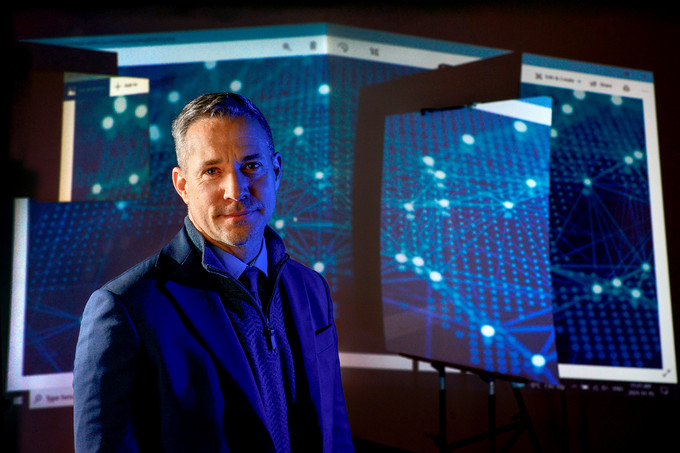
Brian McQuinn
Brian McQuinn is an associate professor of international studies in the Faculty of Arts at the University of Regina and Co-director of the Centre for Artificial Intelligence, Data, and Conflict (CAIDAC). He has more than two decades of experience working in more than 30 conflict-affected countries, including Libya, South Sudan, and Nepal. Brian completed his doctorate at the University of Oxford after nine months of fieldwork in Libya, where he lived with insurgents fighting to overthrow Qaddafi, and has since advised international organizations, governments, and civil society networks. His current research explores how extremist networks and authoritarian states exploit digital platforms and emerging technologies to weaken democracies and erode trust in social institutions. A frequent contributor to national security and artificial intelligence discussions, his work with CAIDAC has been featured in The New York Times, The Guardian, and The Globe and Mail.
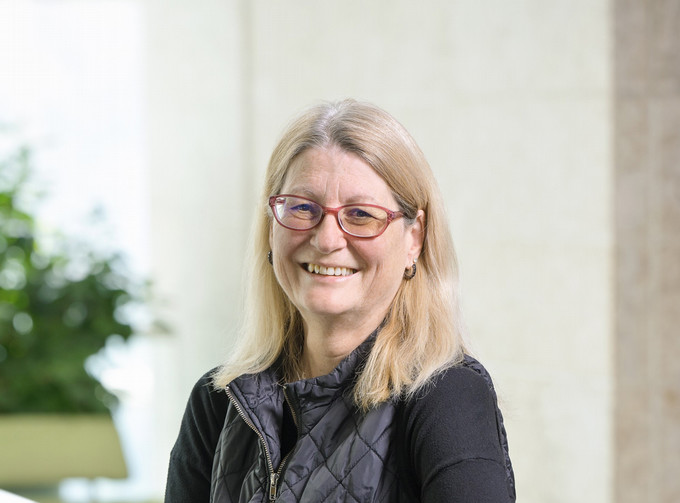
Renata Raina-Fulton
Renata Raina-Fulton is professor and department head of chemistry and biochemistry in the Faculty of Science at the University of Regina. An environmental and analytical chemist, she has worked in industry, government, and academic positions on air quality studies throughout North America for more than 30 years. Her research, funded through the Natural Sciences and Engineering Research Council of Canada, tracks how pesticides and other contaminants move through the atmosphere—including those released by wildfires in agricultural and remote regions. She also develops new ways to detect these substances, even in extremely small amounts, to better understand their effects on the environment. Chromatography-mass spectrometry methods are developed to detect these contaminants or their transformation products at trace levels in the environment. Renata has been the Director of the Trace Analysis Facility at the U of R since 2005 and received the U of R Distinguished Long-Service Award in Science in 2022.
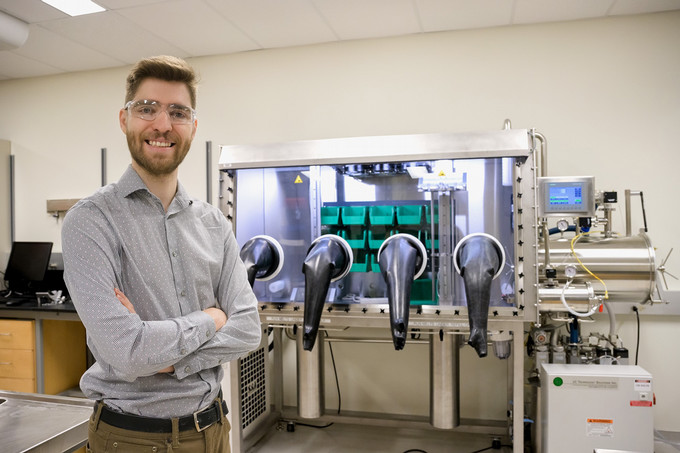
Arthur Situm
Arthur Situm is a Tier 2 Canada Research Chair in Small Modular Reactor (SMR) Safety and Licensing, and a professor in the energy systems engineering program in the University of Regina’s Faculty of Engineering and Applied Science. He leads the SMR Fuel Corrosion Lab, managing around $2 million in research funding focused on radioactive waste management, the development of novel fuel for SMRs, and studying molten salts for advanced SMR designs. Arthur holds bachelor’s and master’s degrees in chemistry from Wilfrid Laurier University and the University of Saskatchewan. Since 2018, he has held senior leadership positions in the Canadian Nuclear Society (CNS) and currently serves on CNS Council and as co-chair of the Generation IV and SMR (G4SR) Division and International Conference.
Graduate Researchers

Shaelyn Carr
Shaelyn Carr is a PhD student in experimental and applied psychology in the Faculty of Arts at the University of Regina. Supported by a Social Sciences and Humanities Research Council (SSHRC) doctoral award, she secured more than $235,000 in research funding. Shaelyn’s work examines the intersection of memory, credibility, and the law, with a dissertation on how alibi testimony is produced, evaluated, and perceived in the justice system. More broadly, she studies how social and cognitive processes influence the accuracy and believability of testimony, eyewitness identifications, and other forms of evidence, with the goal of advancing fairer legal outcomes. Shaelyn has taught several U of R courses, developed and taught Children and the Law, co-supervised honours students, mentored more than 70 undergraduate and graduate research assistants, and co-founded INSPIRE, a graduate student initiative promoting collaboration and professional development.
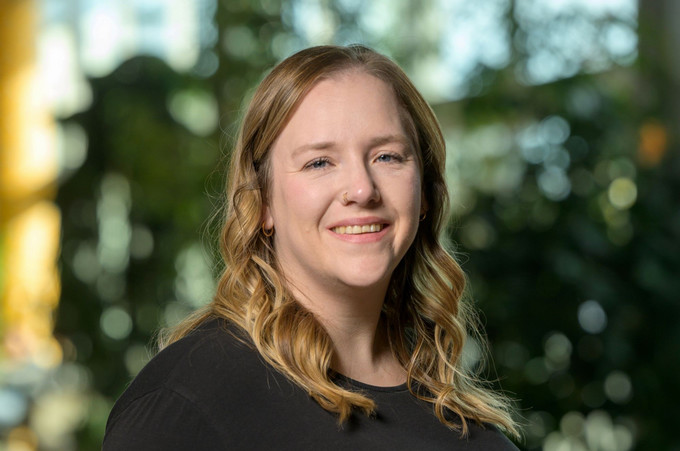
Baily Hack
Baily Hack is a graduate student in the Faculty of Social Work at the University of Regina. She has professional work experience in child welfare, newcomer support, clinical counselling, and oncology social work. Her research focuses on anti-racist practices in schools, newcomer experiences in Canada, and mental-health services. Drawing on feminist frameworks and critical race theory, Baily explores the intersection of race and gender, particularly as it relates to the experiences of immigrant and migrant children and youth in Canada. She won the University of Regina 2025 Three Minute Thesis (3MT) competition and represented the University at the 2025 Western Regional 3MT in Victoria.
